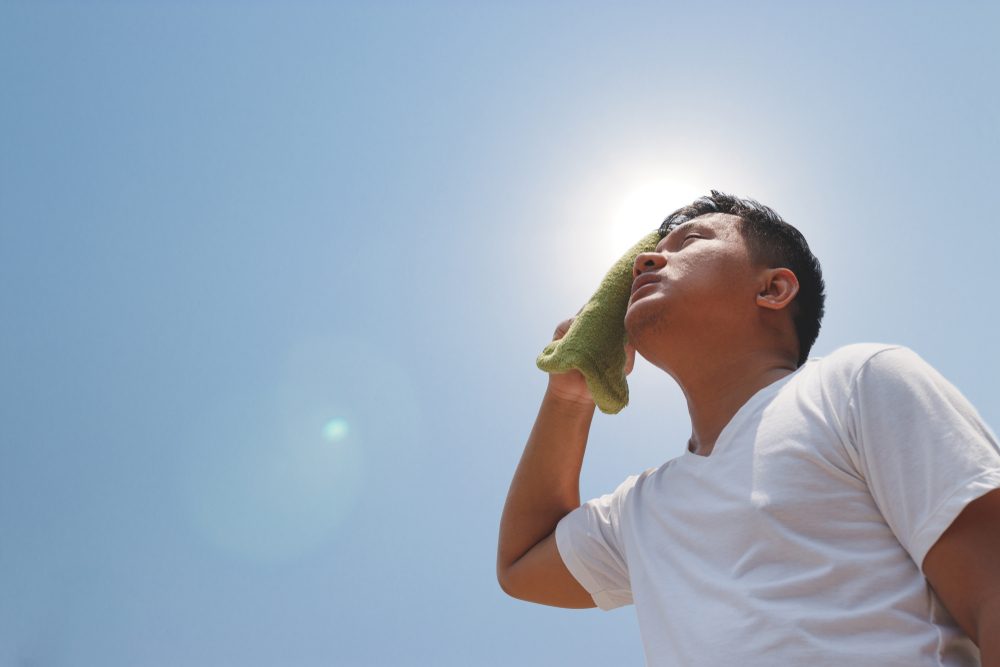Dehydration occurs when your body loses or uses more fluids than it takes in. This can happen when you stop drinking water. It can also occur when you lose large amounts of fluid through diarrhea, vomiting, sweating, or exercise. When it happens, your body isn’t able to do all the things it’s supposed to.
The human body is roughly 75 percent water. Without this water, it cannot survive. Water is found inside cells, within blood vessels, and between cells. Your body loses water primarily through urine, sweat, exhaling, feces and perspiration. The two main sources to replace the water lost from your body is – food and beverages.
ADVERTISEMENT
Water is important to the body at all times, but especially in warm weather. It keeps the body from overheating. When you exercise, your muscles generate heat. To keep from burning up, your body needs to get rid of that heat.

You can usually treat mild dehydration at home by drinking more fluids. But moderate and severe cases may need to go to the hospital to receive intravenous (IV) fluids. It could be fatal if not treated.
What causes dehydration?
You can become dehydrated if you lose too much fluid, do not drink enough water or fluids, or both.
Your body may lose a lot of fluid from:
- Sweating too much, for example, from exercising in hot weather
- Burns
- Excessive bleeding
- Fever
- Vomiting or diarrhea
- Drinking too much alcohol
- Urinating too much (uncontrolled diabetes or some medications, like diuretics, can cause you to urinate a lot)
A lack of fluids may also occur because there is insufficient intake. This can happen:
ADVERTISEMENT
- In infants who cannot communicate thirst
- Due to nausea
- In people with inflamed mouths or sore throats who don’t drink enough because of the pain
- In some elderly people who need assistance with access to water
- Due to a lack of available water
- With a decreased sense of thirst or appetite
Who is at risk from dehydration?
Anyone can become dehydrated, but certain groups are particularly at risk. These include:
ADVERTISEMENT
- babies and infants – they have a low body weight and are sensitive to even small amounts of fluid loss
- older people – they may be less aware that they are becoming dehydrated and need to keep drinking fluids
- people with a long-term health condition – such as diabetes or alcoholism
- athletes – they can lose a large amount of body fluid through sweat when exercising for long periods
What Are the Signs and Symptoms of Dehydration?

Signs and symptoms of dehydration in adults include:
- Increased thirst
- Light-headedness
- Headache
- Dry mouth and tongue
- Lethargy/tiredness
- Muscle cramps
- Confusion
- Dark coloured, strong-smelling urine
- Not urinating much and/or passing urine less often than normal.
Signs and symptoms of dehydration in babies and young children include:
- Dry mouth and tongue
- Fewer or no wet nappies
- Fewer or no tears when crying
- Sunken soft spot on their head (fontanelle)
- Sunken eyes and cheeks
- Listlessness
- Irritability
Severe dehydration can cause increasingly serious signs and symptoms, such as:
- Lack of tears and sweating
- Lack of urine – little to no urine produced and dark yellow in color
- Intense thirst
- Extremely dry mouth and mucous membranes
- Dry skin that lacks elasticity
- Sunken eyes in an infant
- Sunken fontanelles in an infant (the soft spots on top of the head)
- Rapid breathing
- Increased heart rate
- Low blood pressure
- Confusion and, in critical cases, unconsciousness
How is dehydration treated?
Mild to moderate dehydration can usually be treated at home. Here are things you can do to feel better.
- Sip water.
- Suck on ice cubes or ice pops.
- Slowly drink a sports drink that contains electrolytes.
- Get out of direct sunlight and lie down in a cool spot, such as in the shade or an air-conditioned area.
- Prop up your feet.
- Take off any extra clothes.
- Don’t drink anything with caffeine, including coffee, tea, or colas. Because, caffeine may cause you to urinate more.

How to prevent dehydration
The following tips may help you prevent dehydration.
- Drink plenty of water before, while, and after you are active. This is very important when it’s hot out and when you do intense exercise. You can drink water or rehydration drinks.
- Drink plenty of water before, during, and after exercise.
- Take a container of water or sports drink with you when you exercise, and try to drink at least every 15 to 20 minutes.
- Use a sports drink if you will be exercising for longer than 1 hour.
- Encourage your child to drink extra fluids or suck on flavoured ice pops, such as Popsicles.
- Avoid high-protein diets. If you are on a high-protein diet, make sure that you drink at least 8 to 12 glasses of water each day.
- Avoid alcohol, including beer and wine. They increase dehydration and make it hard to make good decisions.
- Do not take salt tablets. Most people get plenty of salt in their diets. Use a sports drink if you are worried about replacing minerals lost through sweating.
- Stop working outdoors or exercising if you either feel dizzy, light-headed, or very tired.
- Wear one layer of lightweight, light-coloured clothing when you are working or exercising outdoors. Change into dry clothing as soon as you can if your clothes get soaked with sweat. Also, Never exercise in a rubber suit.
 AndSolo Education, Information & More
AndSolo Education, Information & More